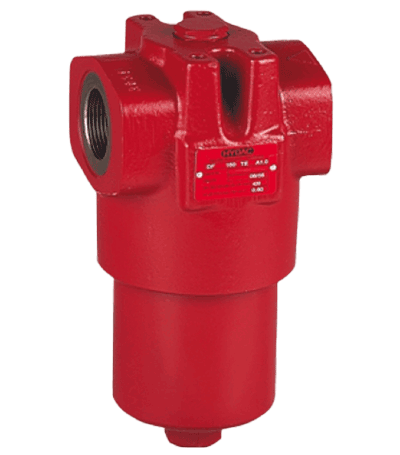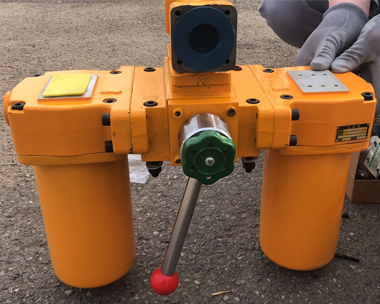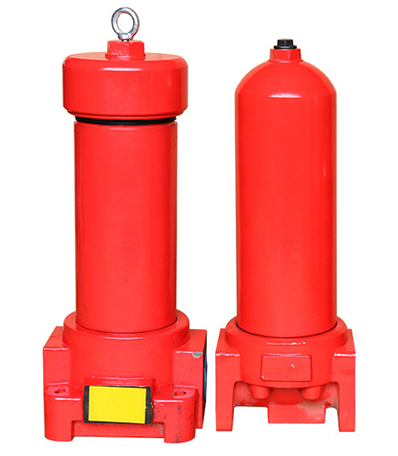In the field of natural gas, the oil filter assembly is a key device for filtering liquid droplets and particles in natural gas. It can not only protect downstream equipment and improve operating efficiency, but also save costs and reduce the use of consumables. Its application is introduced in detail below:
Removal of particles and droplets: Natural gas may contain droplets and particles of various sizes during its extraction, processing, and transportation processes. These substances may contaminate the equipment, affect its performance, or even cause damage to the equipment. Oil filters can effectively filter out these particles and droplets, thereby protecting equipment and improving production efficiency.
Improved product quality: During the natural gas liquefaction process, the presence of any impurities or droplets may result in reduced product quality. Oil filters help produce high-quality LNG products by filtering out impurities and droplets during this process.
Reduce maintenance and operating costs: Liquid droplets and particles in natural gas may cause corrosion and blockage of pipelines, valves and other equipment, thereby increasing the frequency and cost of maintenance and replacement parts. The use of oil filters can effectively reduce the occurrence of these problems, thereby reducing maintenance and operating costs.
Reduce environmental impact: Good natural gas filtration procedures can reduce pollution caused by droplets and particles dispersing into the environment. In addition, using high-efficiency oil filter components can also save resources and reduce waste generation by reducing the need for equipment maintenance and replacement parts.
Improved throughput and system stability: High-efficiency oil filter assemblies improve fluidity and throughput during natural gas processing and production by filtering out droplets and particulates, thereby enhancing system stability and reliability.
To sum up, oil filter components have many applications in the natural gas field. Their main functions are to improve product quality, protect equipment, reduce operating and maintenance costs, and reduce environmental impact.

The working principle of the oil filter assembly is based on the theories of physical filtration and adsorption. These components are mainly composed of filter elements and filter housings. Detailed introduction below:
(1) Physical filtration
Direct interception: When the fluid passes through the lost core, due to the pore size setting in the filter element, particles or droplets larger than the pore size of the filter element cannot pass through and are thus intercepted. This process depends on the size of the pores. If the pores are small enough, even tiny particles and droplets cannot pass. Therefore, different filter elements can be selected to achieve different filtration purposes.
Inertial collision and centrifugal separation: Under high flow rate conditions, larger particles or droplets cannot turn due to inertial force, so they directly hit the filter element and are trapped. At the same time, by setting up a vortex or similar structure, large particles and droplets are thrown to the wall under the action of centrifugal force and thus separated.
Diffusion: For particularly small particles, they are affected by Brownian motion and bump around randomly. In this case, particles will randomly hit the filter element and be trapped.
(2) Adsorption
The adsorbent part of the filter material absorbs small particles or droplets in the fluid. These adsorbed particles or droplets will remain in the filter element, and only clean fluid can pass through. Therefore, during the use of the filter, the filter element needs to be replaced and maintained regularly to ensure the filtration effect.
(3) Electrostatic adsorption
Some filter elements have electrostatic properties and have an electrostatic field. When charged particles in the flowing air pass through the filter element, they are attracted to the filter element by the electrostatic field. This can not only filter out large particles, but also filter out smaller particles, greatly improving the filtration effect.
The realization of the working principle of the oil filter assembly can not only better filter the fluid that needs to be filtered and improve the use effect of the fluid, but also play a positive role in protecting equipment, ensuring product quality, and reducing costs.
Oil filter assembly mainly refers to equipment composed of filter housing, filter element, sealing ring, installation and connection parts, etc., used to filter solid impurities and liquid impurities in various fluids. Its main advantages include:
High performance and efficiency: Oil filter assemblies usually use high-performance filter elements, which can perform efficient filtration and cleaning regardless of the size or concentration of particles. This is because the filter element uses special materials and manufacturing processes (such as nanoscale filter materials), which can accurately intercept particles and droplets without affecting the flow rate of raw materials.
Durability: High-quality oil filter assembly offers excellent durability. Its manufacturing materials and processes make it resistant to corrosion, high temperatures, and stable to a wide range of chemical and physical conditions. These characteristics enable the filter assembly to operate stably for a long time under harsh working conditions, reducing the frequency of replacement, thereby saving maintenance costs.
Flexibility and compatibility: The design of the oil filter assembly is usually highly flexible, and the filter element can be replaced with different types or sizes according to needs and conditions to adapt to various environments and applications. At the same time, the filter interface design is diverse, has good compatibility, and can be easily connected to various systems.
Saving operating costs: First of all, the high-efficiency filtration capability of the oil filter assembly can extend the service life of the equipment, reduce or avoid equipment failure and damage caused by impurities, thereby saving the cost of repairing and replacing equipment. Secondly, some regularly self-cleaning filter assemblies can maintain efficient filtration performance and reduce the frequency of filter element replacement, thereby saving labor and material costs. Thirdly, some filter assemblies have recycling and processing functions, which not only saves energy but also protects the environment.
Improve product quality: Oil filter assembly is an essential piece of equipment in many manufacturing processes, especially in industries that require high purity such as pharmaceuticals, food, and beverages. Efficient filtration can remove impurities, improve product quality and stability, and meet or exceed industry safety and health standards.
Environmentally friendly: Modern oil filter assemblies usually feature low energy consumption or zero emissions, complying with the principles of green environmental protection. The design of some filter assemblies can even be used for material recycling and resource reuse.
High degree of automation: Many advanced oil filter assemblies come with intelligent monitoring systems that can monitor filtration effects and equipment status in real time, automatically perform cleaning and maintenance operations, reduce manual intervention, and improve filtration efficiency and equipment availability.

The cost-saving advantages of the oil filter assembly can be analyzed more specifically from the following aspects:
Equipment protection: The main task of the oil filter assembly is to remove sediments and other impurities from lubricating oil, engine oil or gear oil. Unfiltered oil may carry microscopic particles, such as metal shavings or splinters, which may wear and damage the machine's internal parts, causing earlier wear and possible equipment failure. Using the oil filter assembly, oil impurities are effectively filtered, extending the life of the equipment and reducing maintenance and replacement costs.
Increased lubricating oil service life: The filter maintains the cleanliness of the lubricating oil by removing dirt and impurities, which can extend the lubricating oil service life. This avoids frequent lubricant changes, saving lubricant expenses and associated labor replacement costs.
Improve equipment operating efficiency: Good and clean lubricating oil can better lubricate equipment, reduce friction and heat during equipment operation, thereby improving equipment performance and efficiency. Reducing equipment downtime caused by high wear and overheating also eliminates operational losses caused by equipment inefficiency or downtime.
Reduce labor and filter element replacement costs: The high-efficiency filter assembly can reduce the frequency of filter element replacement due to its longer service life, thereby saving labor and filter element material costs. Some advanced filters have self-cleaning, self-monitoring and other functions, which can automatically identify and remove dirt on the filter, reducing the frequency and cost of manual maintenance in every possible way.
Save energy: In addition to protecting equipment and improving equipment efficiency, high-quality oil filter assemblies also help save energy. Clean lubricants better lubricate internal parts, reduce friction and increase efficiency, which also means the equipment requires less energy.
Lower total cost of ownership: Some filters with innovative designs optimize pressure drop during normal operation and reduce energy consumption, thereby lowering overall operating costs. At the same time, the tube shell and filter element of some filters are detachable, and the filter element can be replaced individually, which avoids the cost of overall replacement and greatly reduces the total cost of ownership.
Through the above methods, the oil filter assembly can largely help reduce various costs during long-term operation and improve economic benefits.
How the oil filter assembly improves the operating efficiency of the equipment:
Clean lubricating oil: Lubricating oil is the key to ensuring the normal operation of the equipment. It reduces the friction during equipment operation and protects the internal parts of the equipment. However, during operation, the lubricating oil may carry away tiny metal particles, impurities or moisture from inside the equipment. When these particles and impurities accumulate, they can significantly reduce the quality and effectiveness of the lubricant. The oil filter assembly is a tool to remove these contaminants. They can ensure the cleanliness and quality of the lubricating oil, so that the parts inside the equipment can be properly protected, thereby improving the efficiency of equipment operation.
Reduce equipment energy consumption: Clean and high-quality lubricants can effectively reduce friction and heat inside the equipment, which will make the equipment run more smoothly and reduce its energy consumption. Lower energy consumption not only means reduced electricity costs, but may also extend the operating life of the equipment due to low wear and low heat, thereby reducing the reduced work efficiency of the equipment due to abnormal operation or frequent shutdowns.
Extend the life of the equipment: A good oil filter can effectively absorb and retain tiny metal particles and impurities in the lubricating oil. This not only protects the equipment from being worn by these impurities, but also prevents the equipment from being blocked or causing equipment failure due to impurities. Parts need to be replaced, so the life of the equipment is extended, the cost of maintenance and replacement parts is saved, and the overall operating efficiency of the equipment is naturally improved.
Maintain equipment operation stability: The oil filter assembly ensures the cleanliness and quality of lubricating oil, which greatly reduces the probability of equipment failure due to wear and pollution. The stability of equipment operation directly affects its operating efficiency - equipment failure will not only cause work to be stopped, but also require time and money to be repaired or replaced. Therefore, the use of oil filters reduces equipment failures and improves equipment operating efficiency.
Optimized oil circuit design: High-quality oil filters usually have scientific oil circuit designs, such as using pressure differences to improve oil filtration efficiency, or designing ingenious filter membranes in the throttling link, which can effectively prevent clogging and ensure smooth oil circuits. The oil path of the equipment is unobstructed, which helps the lubricating oil to quickly cover all parts of the equipment, thereby ensuring the efficient operation of the equipment. When the equipment needs to operate under a higher workload, the high-efficiency oil filter assembly can ensure that the lubricating oil quickly and fully lubricates various parts, helping the equipment to maintain efficient and stable operation under high loads.
In summary, the role of the oil filter assembly is to ensure the quality of lubricating oil, protect equipment parts, reduce equipment wear, and provide a better operating environment for the equipment, thereby improving the operating efficiency of the equipment. At the same time, when selecting an oil filter assembly, efficient and durable products can provide long-term and stable lubrication guarantee for the equipment, and can also improve the operating efficiency of the equipment.

How does the oil filter assembly optimize the oil circuit design of the equipment:
Improved filtration principle: The filter element in lubricating oil is often filtered from the inside out. Large impurities in the oil are intercepted when they come into contact with the inner wall of the filter element. Small impurities will gradually stay in the filter element, effectively It avoids the wear of equipment caused by large impurities and the influence of small impurities on oil viscosity. This filtration method can increase the filtration area, improve filtration efficiency, and reduce the possibility of clogging, allowing the lubricating oil to flow through the filter more smoothly and quickly to various parts of the equipment for lubrication.
Optimized pipeline design: Optimized oil pipeline design is crisscrossed to ensure smooth oil pipeline. For lubricating oil that needs to be heated, optimized pipeline design can ensure uniform heat distribution and avoid wear and tear on equipment due to too high or too low oil temperature. For components that need to be cooled, some oil filter assemblies integrate electric motor oil pumps, filters and thermal management systems, which can quickly take away the heat of the equipment, optimize the cooling effect, and protect key parts of the equipment.
Precision filtration system: Often an excellent oil filter assembly will have a multi-stage filtration design, and the filtration accuracy of each stage is gradually increased, so that starting from coarse filtration, impurities in the lubricating oil can be gradually screened out. Through multi-stage filtration, the filtration accuracy is improved, the dirt holding capacity of the filter element is increased, and equipment shutdown caused by premature blockage of the filter element is avoided. In addition, some advanced oil filter assemblies are also equipped with automatic detection equipment for filter element contamination, which can accurately control the filtration accuracy and maintain the service life of the filter element.
Three-dimensional circulation technology: This is an advanced oil treatment technology that uses three-dimensional evaporation and multi-level oil-water separation technology to separate moisture and gas in oil in a short time. And its unique design can accurately control the flow rate and flow rate to ensure the smooth flow of oil, while preventing cavitation and other phenomena caused by excessive speed, ensuring the smooth flow of the oil circuit and laying the foundation for the stable operation of the equipment.
Optimize space utilization: The oil filter will take into account the space utilization of the equipment and design a filter of appropriate size and shape, so that the filter can be easily installed where filtration is required, further optimizing the oil circuit design. Its design also takes into account the convenience of replacing the filter element, effectively preventing dirty oil from entering the clean oil chamber. This design not only saves space and time, but also improves the operating efficiency of the equipment.
Through the above optimization, the oil filter assembly can roughly clean the lubricating oil, protect the equipment, reduce equipment failures, and ensure smooth oil passages, thereby improving the operating performance of the equipment and increasing the operating efficiency of the equipment. The oil filter assembly becomes the guardian of the equipment, providing a safer, more efficient, and more stable operating environment for the equipment.
How the oil filter assembly improves the quality of natural gas:
Removal of impurities: During the transportation of natural gas from the wellhead to the user end, impurities such as soil, dust, and oil droplets will inevitably be absorbed. Additionally, it may contain moisture and other tiny droplets. These impurities and moisture cannot be seen with the naked eye, but they are enough to affect the quality of natural gas. Oil filter assemblies with high-efficiency filtration capabilities can effectively remove these impurities from natural gas. For example, it may perform multi-stage filtration of natural gas, starting with coarse filtration, then gradually increasing the filtration precision, and finally removing tiny particles and droplets.
Prevent equipment damage: If particles or liquid impurities in natural gas cannot be effectively removed, they may cause corrosion to pipelines and equipment, reduce equipment performance, and even cause equipment failure. The use of high-efficiency oil filter assembly can avoid this situation. By continuously removing impurities from natural gas, we can protect the stable operation of pipelines and equipment, prevent equipment failures caused by impurities, and maintain a stable supply of natural gas.
Improve combustion efficiency: If natural gas contains too many impurities, it may cause combustion efficiency to decrease. Because these impurities may affect the combustion process, resulting in incomplete combustion. The high-efficiency oil filter assembly can filter out impurities in natural gas, thereby maintaining the high fuel value of natural gas, improving the operating efficiency of the equipment, and saving energy.
Extend the service life of the equipment: The use of natural gas containing impurities in the equipment may increase the operating pressure of the equipment, causing premature wear of the equipment and reducing its service life. Effectively filtering impurities in natural gas can not only protect equipment and avoid failures, but also extend the service life of equipment, reduce equipment maintenance and replacement costs, and save economic expenses.








